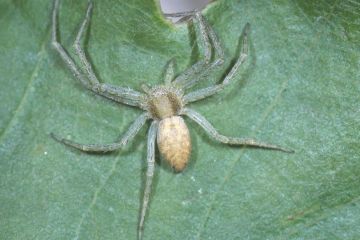Summary for Philodromus albidus (Araneae)
previous species | next species
National Distribution
Terms of Use. Double-click on map to go to region

Explore Regional Distribution
Please log on and add a note on this species
About this species
Recorded altitude range0m to 200m
Species text
DistributionThe species is confined to the southern half of England. It is widespread in western and central Europe, but has not been recorded from Scandinavia or Ireland.
Habitat and ecology
The spider is usually found in broad-leaved or mixed woodland on the lower branches of broad-leaved trees such as oak at the edge of clearings or rides. It is also found in old hedgerows and green lanes. Adults of both sexes have been found from May to July with a peak in June.
Status
Most references in literature suggest that the species is never very numerous (Merrett 1990) or that only single individuals are usually found (e.g. Crocker & Daws 1996), but this has not been the case in Essex where it has been a widespread and often frequent spider since at least the early 1980s. The species has now seemingly been increasing in frequency and turning up in new locations in other parts of England in recent years. The spider is not uncommon on old trees at some sites in southern Oxfordshire (J. Denton pers. comm.) and it has been found in numbers in Huntingdonshire (I. Dawson, pers. comm.). The species formerly known as P. rufus was split into P. rufus and P. albidus (Dondale 1972; Segers 1989) for information on P.rufus sens. str. see that species account.
Threats
The majority of records are from trees or bushes at the edge of clearings or in hedgerows. Lack of management resulting in the closure of open woodland and the loss of old hedgerows are almost certainly detrimental to this species. Spray drift from the use of pesticides on crops is likely to affect the survival of this spider, as well as many other invertebrates, where arable fields are adjacent to woodland or hedgerows.
Management and conservation
Management should retain open surroundings by rotational cutting of woodland ride vegetation, periodic control of scrub and tree invasion and light grazing in woodland pasture. The retention of wide field edges and headlands should be encouraged to help maintain a diverse invertebrate fauna and reduce the effects of spray drift on old trees in hedgerows and at the edge of woodland.
Original author of profile: P.R. Harvey
Text based on Harvey, P.R., Nellist, D.R. & Telfer, M.G. (eds) 2002. Provisional atlas of British spiders (Arachnida, Araneae), Volumes 1 & 2. Huntingdon: Biological Records Centre. References
Account last edited by Matt Prince at 21:59 on Fri 18th Jun 2021.
Adult Season
Habitats
background methodology
Recorded management for locations with Philodromus albidus
Recorded substrate and hydrology for locations with Philodromus albidus
Images
please log on and upload a new image for this speciesSee also A-Z Species Index - A-Z Picture Index - previous species | next species





